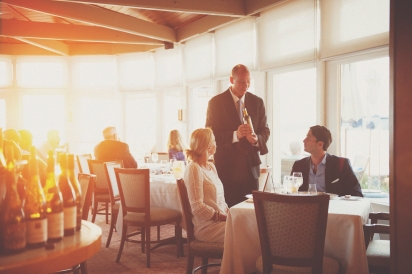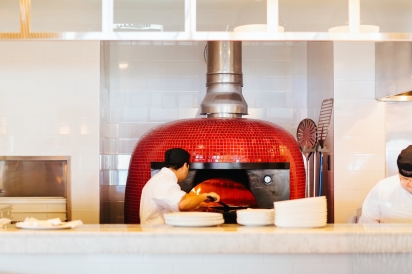Millennials and the Restaurant Industry
Millennials are now the largest generation in the United States at a whopping 80 million people, about one quarter of the U.S. population. It is projected that they have over $2.45 trillion in spending power. Recent studies show that Millennials (also known as Generation Y) are spending more on dining out than any other generation. However, trends like the “The Seamless Effect,” as described by Forbes Magazine, are changing how Millennials are spending their money on food through delivery apps like Grubhub Seamless. Apps like these, which source restaurants for home delivery, plus dinner subscription services like Blue Apron and Fresh Direct are forcing restaurants to change their business strategies to stay relevant.
To learn more about how Millennials are beginning to affect the restaurant industry in Rhode Island, Edible Rhody spoke with Casey Riley, chief operating officer of the Newport Harbor Corporation. Chef Riley, a New Mexico native, began his culinary career in 1984 as a dishwasher. After culinary school, he worked his way up through the ranks at L’Espalier in Boston, Agora in Providence and finally as executive chef of Castle Hill Inn & Resort, in Newport, before moving to its parent group, Newport Harbor Corporation. Now as COO, Riley oversees all of their dining and hotel operations, including the 13 restaurants, one Relais & Chateaux inn and two private event venues run by Newport Restaurant Group. After more than 30 years in the industry, Riley has witnessed many changes. Here’s what he told us about Millennials and their impact the restaurant business:
What is the Rhode Island restaurant industry like today compared to 2008?
I think the two biggest changes in the last decade have been the growth of local foods and local artisans making foods. This falls both inside and outside the restaurant as there are plenty of artisans who support restaurants. One of the biggest evolutions in local agriculture has been in increased livestock production, which has made it easier to get local meats and cheeses. With regard to restaurants, you see more smaller, chef-centered restaurants that have smaller footprints. Also there are a lot more restaurants: There’s no question that the amount of restaurants today compared to 10 years ago is much higher. It’s off the charts. In general, there are a lot more options [than there were] for people coming out of the 2008 recession.
On average, how many customers do restaurants like Hemingway’s and The Mooring see in a given month?
Those two restaurants are very different. Newport is a community, as well as a tourist destination, giving it a more diverse economy. The Mooring has a great year-round following. During the off season, in a given month The Mooring will probably do 6,000 to 7,000 covers a month. During the summer that number easily goes to almost 20,000 a month, with the tourists giving the restaurant that bump in numbers. The people who come in the winter are local people who are just looking to enjoy a meal. You find that a lot of people who live in Middletown, Portsmouth, Tiverton or North Kingstown don’t really gravitate to Newport during July and August. They wait until the bulk of the tourists have moved out and then they go. Hemingway’s, on the other hand, being in the city, has a very stable and consistent flow of guests. There we will do a little more than 120,000 covers a year, having a pretty steady flow of 9,000–12,000 guests a month. These are very busy, well-known restaurants.
What is the general age of the majority of Newport Restaurant Group Rhode Island customers?
At this point Generation X has the highest presence in our restaurants. Ten years ago it was the Baby Boomers. That is just the natural evolution of things. Generation Y and the Millennials are starting to gravitate to our restaurants. Our restaurants are not necessarily the hip and cool restaurants but we are focused on great food and great hospitality. I think as life circumstances change, people tend to go towards different things. We are mindful of the goal to evolve our appeal to the Millennial generation as that generation matures. Most of the industry recognizes that the generation is very large and will have a huge economic impact in the future. But right now, a lot of the career wealth is found in Generation X.
How do you think the Millennial generation is impacting the restaurant industry in general and in Rhode Island specifically?
Over all, the biggest thing I see is the amount of avenues for people to find great food today. It used to be, in order to have really great food, you had to go to a fine-dining restaurant. There was no other option. [These days] you have Blue Apron, which will deliver ingredients and instructions to you. You have meal deliveries from awesome restaurants. There are some formats, like David Chang’s start up in New York City, with no tables, that just does delivery. In the future, this is something the restaurant industry has to really focus on. In Rhode Island specifically, you have many small, eclectic neighborhoods where there are enormous amounts of restaurants doing really good work. This specifically is where a lot of the younger generation is spending their money. This authentic and genuine setting speaks to their ethos. Along with this, instead of spending $60 on dinner, people are able to spend $30. You can still get awesome food and an awesome drink and you’re not paying for all the overhead. That affordability and accessibility appeals to the Millennial generation.
Many people say that the Millennial dining trends are causing a decline in the business. Would you say this is true for Rhode Island restaurants?
I am a Generation X guy but the way I see it is, the Millennials are getting a lot of exposure—some of it negative, some of it positive. But what is myth versus reality when it comes to this generation? I think most generations get into what they love and change the social norms. I think that is where the Millennials are having their impact: They are changing the way we view things. I think because of the size of the generation, there’s no question that this is very impactful. As they grow and mature, their tastes and preferences will evolve with them. To be honest, I feel like we are prejudging that generation. For me as a manager at a company that serves people, I don’t want to prejudge anyone. I think it is too early [to say]. The generation still has to grow and find itself.







